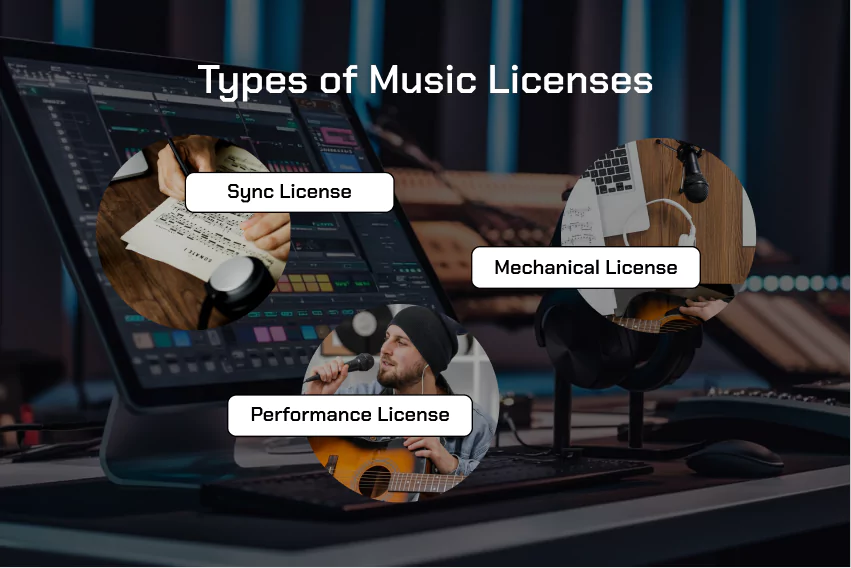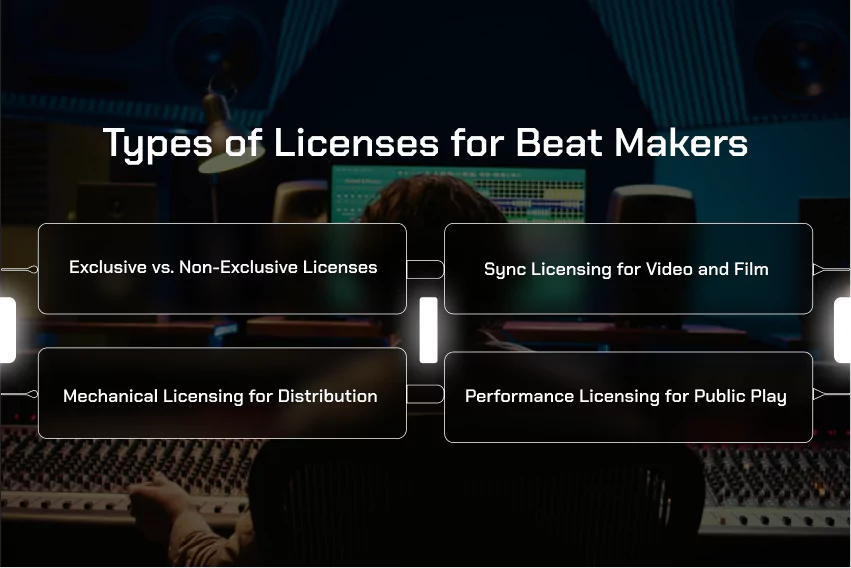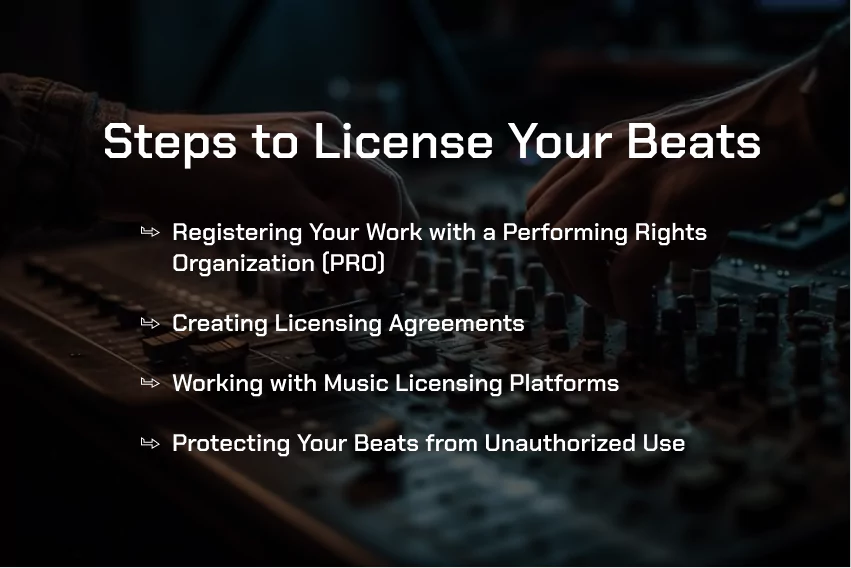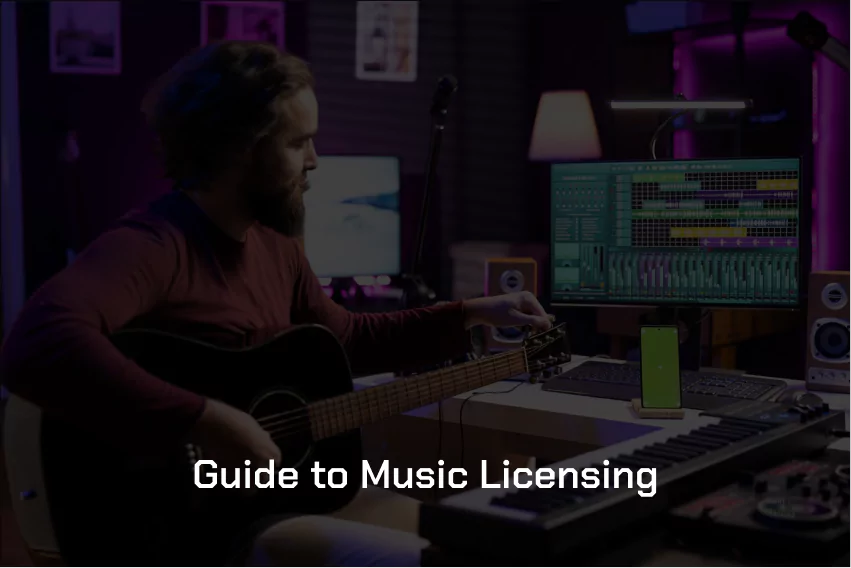Importance of Music Licensing for Beat Makers
Beat makers must understand music licensing in today’s digital world, where Hip Hop Beats for Sale, Rap Beats for Sale, and Instrumentals for Sale are everywhere.
Whether you sell Exclusive Beats or Cheap Exclusive Beats, protecting your intellectual property is what matters most. Through licensing you can be sure that your hard work as a beat maker will be acknowledged and rewarded.
By being familiar with the different types of music licenses, you can protect your Rap Beats and Hip Hop Instrumentals from unauthorized use. Music licensing is the foundation of a successful beat making business whether one makes boom bap beats or trap beats for sale.
Read More About The Power Of Licensing And Sync In Rap & Hip Hop
Overview of the Guide
For beat makers, this guide will let you understand what music licensing is all about. It will commence with an analysis of music licensing in relation to its definition and purpose; it highlights the significance of licensing your Rap instruments and Hip Hop Beats.
It also covers multiple types of licenses for different music such as Sync License, Mechanical License and Performance License.
By the time you finish reading this guide, you’ll have enough knowledge to confidently protect your precious creations through a proper understanding of how to navigate yourself through the complex world of music licensing.
Elevate Your Sound—Buy Exclusive Rap Beats from JBZ Now!
|
Understanding Music Licensing
Legal music licensing is an official contract that allows for the usage of copyrighted songs for a given reason. As a beatmaker, your exclusive beats are subject to copyright.
When you license your beats, you permit others to use them in their projects while retaining ownership over the original composition. This makes sure that you get payment for your creative work as well as protects against any utilization of your Hip Hop Instrumentals or Rap Beats which is not authorized.
Types of Music Licenses

Different kinds of music licenses exist, each having specific terms and conditions. In order to save your beats:
Sync License:
This type of license allows one to use a beat in sync with visual media like movies, television series, adverts and video games. A sync license could result in considerable income if your beats are featured in a commercial or popular film.
Mechanical License:
This type of license is for the reproduction of a musical composition such as when a beat is used in a recorded song. When your beat is utilized in a commercially released song, you will need to have mechanical licensing rights.
Performance License:
Public performance licenses refer to the permission to perform music compositions publicly. Although this might not be very relevant to most beat makers, it can help when thinking about live shows or online streaming services.
Therefore, having knowledge about these various types of music licenses will go a long way in securing your Exclusive Beats and ensuring that they are compensated appropriately.
Read More About Why Custom Rap Beats Are Essential For Your Unique Sound
Why Beat Makers Need to License Their Work
Protecting Intellectual Property
Your beats are your IP. Licensing is a necessary step in protecting yourself and your creativity. Your beats are copyrighted just like any other original work of art. When you license your beats, you claim them as yours and make it illegal for anyone else to use unless given permission.
Maximizing Revenue Opportunities
Licensing your beats can be an excellent source of income. Whether selling Exclusive Beats or offering Cheap Exclusive Beats, licensing helps you squeeze maximum value out of your productions. You will be free to structure arrangements based on what license type serves you best, thus maximizing potential revenues.
Legal Protections and Avoiding Infringement
Licensing provides legal protection against infringement of your beats. By specifying the nature of usage, you minimize the risk of disputes and court cases arising from this kind of creative work. What’s more, it shows that you are professional and serious about ensuring that others do not unlawfully utilize what belongs to you intellectually speaking.
Upgrade Your Sound—Purchase Exclusive Rap Beats from JBZ Today!
|
Types of Licenses for Beat Makers

Exclusive vs. Non-Exclusive Licenses
Exclusive License:
It is a grant of sole use of the beat to one person or organization meaning that no other can make use of it.
Non-Exclusive License:
Having many people using the same beat at once, this is often used for beat selling platforms where multiple artists can buy the same beat.
Sync Licensing for Video and Film
A sync license allows your beat to be used in movies, television shows, commercials and video games. These are the types of deals that can make a producer rich as they typically come with upfront fees and royalties.
Mechanical Licensing for Distribution
Mechanical licenses allow you to reproduce your beat on physical or digital media.
If an artist records a song using your beat and releases it, then you will need them to possess mechanical licenses. In most cases, this involves a royalty based on sales.
Performance Licensing for Public Play
Performance licenses cover the public performance of musical compositions (not that pertinent for beat makers).
This includes radio, television and live performances. If your beats get used in live shows or broadcasts, understanding about performance licenses is important.
To effectively protect your beats, optimize revenue opportunities and successfully navigate the music industry requires awareness of these different licensing options.
Read More About Common Myths About Buying Instrumental Beats Online
Steps to License Your Beats

Registering Your Work with a Performing Rights Organization (PRO)
Registering your beats with a Performing Rights Organization (PRO) like ASCAP, BMI, or SESAC is not strictly necessary for licensing but doing so registers you as the beat maker hence you can collect performance royalties whenever your beats are played on radio, television or public places. This step is especially important if you think that your beats might be used in popular media.
Creating Licensing Agreements
For your rights to be safeguarded and the beats terms of use spelt out, a well prepared licensing agreement is necessary. It should enumerate:
- The type of license (exclusive or non-exclusive)
- The scope of use (specific media, platforms, territories)
- Royalty rates and payment terms
- Ownership of the beat (you retain ownership)
- Termination clauses
A music attorney would be ideal in making sure your license agreement is legally binding.
Working with Music Licensing Platforms
A number of sites specialize in connecting beat makers with artists and other users. These sites come with tools for managing licenses, payments, and distribution. Some popular options include:
- Beat marketplaces: Selling beats to artists directly is made possible by platforms like Airbit, Beatstars, and Soundowl.
- Sync licensing platforms: Placing music in film, TV, and advertising is the main concern of such platforms as Audio Network, Musicbed, and APM Music.
Enhance Your Sound—Purchase Exclusive Rap Beats from JBZ Today!
|
Protecting Your Beats from Unauthorized Use
Below are the measures you can take to prevent your beats from being used without your consent.
Watermarking Your Beats
If someone uses your beat without permission, embedding a barely perceptible watermark or signature within it will discourage theft and assist in finding its original creator.
Using Metadata and Proper Tagging
The accurate metadata and tags help search engines and licensing platforms to correctly identify your work, this discouraging unauthorized use and making it easier for prospective licensees to find your music.
Monitoring and Enforcing Your Rights
Keep an eye on online platforms as well as social media for unauthorized use of your beats. If there is any violation, take legal action to preserve your interests.
By doing all these, you will be able to effectively sell the licenses of your beats, protect intellectual property rights and increase the earnings of a beat maker.
Conclusion
In conclusion, anyone aspiring to be a beat maker must know and use music licensing so as to safeguard their intellectual property rights, get maximum revenue as well as avoid legal battles over copyright. Becoming conversant with different licenses and taking measures to protect your work will allow you to confidently wade through the music industry and have it acknowledge your effort.
Licensing your beats is not just about protecting what you have created; it also opens up numerous income streams through sync deals, and mechanical royalties among other things. By creating transparent licensing agreements and utilizing music licensing platforms, you can manage your rights effectively and make money out of your beats. Additionally, securing your position as a professional beat maker involves marking beats with watermarks, and metadata and keeping an eye on unauthorized access.
At JBZ Beats, we are committed to empowering beat makers with the resources they need to succeed in the competitive music industry. Whether you’re looking to buy hip hop beats, rap beats for sale, or instrumentals for sale, our curated selection of exclusive beats for sale and cheap exclusive beats provides a solid foundation for creating impactful music.
Let’s embrace the future of music together—protect and monetize your beats effectively. Explore our beats for sale online, and buy rap beats online to elevate your music career.
FAQs
What is the difference between exclusive and non-exclusive licenses?
Exclusive licenses grant the rights to use a beat to a single individual or entity, meaning no one else can use that beat. Non-exclusive licenses allow multiple parties to use the same beat simultaneously, often at a lower cost.
What should be included in a licensing agreement?
A licensing agreement should include the type of license (exclusive or non-exclusive), the scope of use (media, platforms, territories), royalty rates, payment terms, ownership details, and termination clauses. Consulting a music attorney can ensure your agreement is comprehensive and legally sound.
How can I protect my beats from unauthorized use?
Protect your beats by watermarking them, using proper metadata and tagging, and regularly monitoring online platforms for unauthorized usage. Taking legal action if you discover infringement is also essential.
Can I license a beat that I’ve already sold as a non-exclusive?
Yes, with non-exclusive licenses, you can license the same beat to multiple parties. Each party pays for the right to use the beat under the terms of the non-exclusive license.
Why should I watermark my beats?
Watermarking your beats can deter unauthorized use and help identify you as the original creator if your beat is used without permission. It adds a layer of protection to your intellectual property.
What should I do if I find someone using my beat without permission?
If you find someone using your beat without permission, document the infringement and contact them to request they cease usage or compensate you. If they do not comply, you may need to take legal action to protect your rights.


